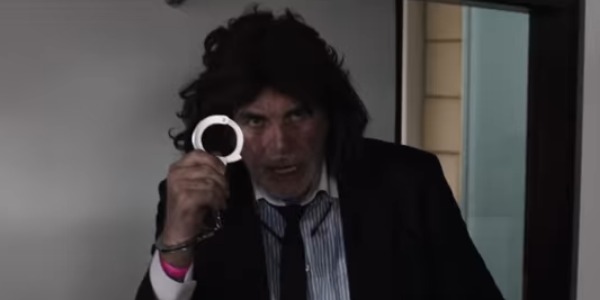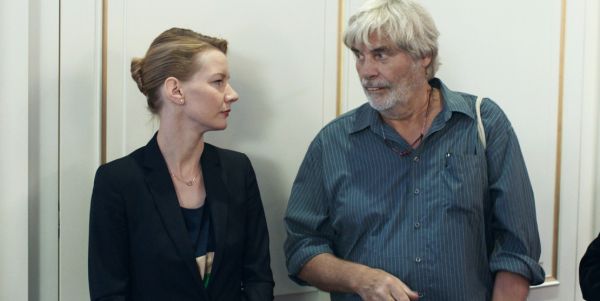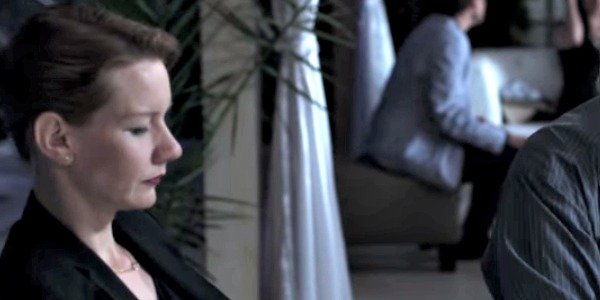TONI ERDMANN: Snap Or Stretch

Ben is a former student of cognitive science who is…
“Mechanical inelasticity” is how Henri Bergson described one of the elements he believed was vital to comedy. After observing that humor is a singularly human sensibility, he proposes that humor arises from the failure to be flexible and adapt to changes in the environment. To see someone exhibit sudden rigidity, like a failing machine, causes our attention to snap from their soul to their body, and we laugh.
Obviously, it would probably be unwise to characterize all humor in such a way (Bergson himself notes that much). But it provides us with an interesting lens to look at Maren Ade‘s Toni Erdmann, for two reasons. One is that inelasticity is the backbone not only of Toni Erdmann‘s gags, but its main character and the world in which she lives as a business consultant. The other is that the contrast between the characters’ inner lives and their outward behavior constitutes the film’s emotional center, and helps it come to life.
Rolling With the Surprises
It’s easy to explain Toni Erdmann‘s concept: Ines, a business consultant working a tough deal in Budapest, gets a surprise visit from her father, a mischievous prankster named Winfried. As you might have already deduced, much of the movie involves Ines getting flustered as Winfried plays crude jokes on her at inconvenient times.
The reason this amounts to one of the year’s best films is threefold: it involves Sandra Hüller‘s performance as Ines, Peter Simonischeck‘s presence as Winfried, and all the moments that are decidedly not funny. Some comedies take place in an elevated reality, in a world that is itself ridiculous. Toni Erdmann does not; Winfried brings ridiculousness into Ines’s serious, professional environment, acting more or less in contrast with the film’s quasi-naturalistic mode of presentation.

As it turns out, Hüller‘s Ines is not only flustered when Winfried is messing with her, but all the time. She’s high-strung, a state evidently brought about by the fact that her work environment is constantly calling her to do contrary things: on the one hand, she has to be able to adapt to the caprices of any executives her company wants to make a deal with; on the other hand, she has to abide proper etiquette at all times. Her job keeps her constantly active and constantly self-conscious. Whether the film’s being funny or not, scenes that revolve around Ines tend to expose her barely-stable capacity to deal with workplace stressors. If not that, they might expose the moral and logistical complexity of her job.
Simonischeck, meanwhile, makes Winfried’s physical presence every bit as notable as his behavior. He’s an inelegant, slow-moving man who simultaneously shows off both his age and his enthusiasm. The sheer awkwardness of having him around establishes him as a distortion on Ines’s ordinarily tightly-managed world, and makes for some of the film’s funniest moments when he appears on the scene unexpected.

His intrusion into Ines’s life disrupts everything, and the film approaches this with intelligence. Winfried is worse than just a nuisance: even though Ines is under a lot of stress, she’s at least developed some adaptation to it, and he interferes with that. In fact, never once does his presence directly affect her business; her colleagues find him charming and are happy to have him around. The problem is that when the systems Ines uses to manage her life are interrupted, cognitive exhaustion approaches that much faster.
Two Lines Converging
When Ines finally can’t take it anymore, the viewer realizes it slowly (such is the case with much of the rest of the film). Something else also becomes clear at the very same time: most of the people surrounding her aren’t any more stable than she is. They’re so committed to their trajectories through life as professional people that they and Ines all take part in what I can only think is one of the most spectacular scenes of the year. I won’t spoil it.
It comes to the forefront that in addition to examining Ines’s own life, the film has also been taking apart the efforts Ines’s company has put into taking care of their employees. It suggests that the exercises and perks meant to help her relax and get along with her colleagues were, to an extent, manipulative on top of being helpful.

In turn, this allows the film to attest to Ines’s moral character. The film exposes her employers’ manipulative folly by exploring her life; consequently, it implies that she has some conviction in principles that oppose the pragmatic underhandedness of her clients. Some may feel that Toni Erdmann dodges global problems by focusing on Ines, who only has a small part in them. While I can understand this, I do appreciate that the film at least takes a firm stance that there is a problem, and that it’s a complicated, systemic one.
After it reaches this point, Toni Erdmann further develops its consideration of Winfried’s age and his parental relationship with Ines. While this isn’t the first time this topic comes up, it’s a time for Winfried to rise above being mostly a distortion on the film’s world, allowing us to understand him a little better. To refer back to Bergson: in the end, for both Winfried and Ines, the film turns our attention back to their souls.
To Conclude
When I went to see Toni Erdmann, the audience seemed more than receptive to its jokes. Still, it wasn’t surprising to see that not every person who saw it laughed. It’s a very long movie, and can seem aimless. It’s not until late in the film that everything really coheres, and some may find it still doesn’t cohere as well as it could.
Nevertheless, I have no doubt that plenty of people will remain fully engaged for the film’s 2 hours and 42 minutes. And if not, it might still be worth seeing just for that one scene. In my eyes it’s one of 2016’s best.
What did you think of Toni Erdmann?
Toni Erdmann will be released in the United States on December 25, 2016, and in the United Kingdom on February 3, 2017.
Does content like this matter to you?
Become a Member and support film journalism. Unlock access to all of Film Inquiry`s great articles. Join a community of like-minded readers who are passionate about cinema - get access to our private members Network, give back to independent filmmakers, and more.
Ben is a former student of cognitive science who is currently trying to improve his writing style and ability to understand and appreciate films containing unfamiliar perspectives. He tries not to hold films to a strict set of criteria, but does believe that strong movies can change your outlook on the world. His favorite films include Whisper of the Heart, Hellzapoppin', Foolish Wives, 42nd Street, and the work of Charlie Chaplin.













